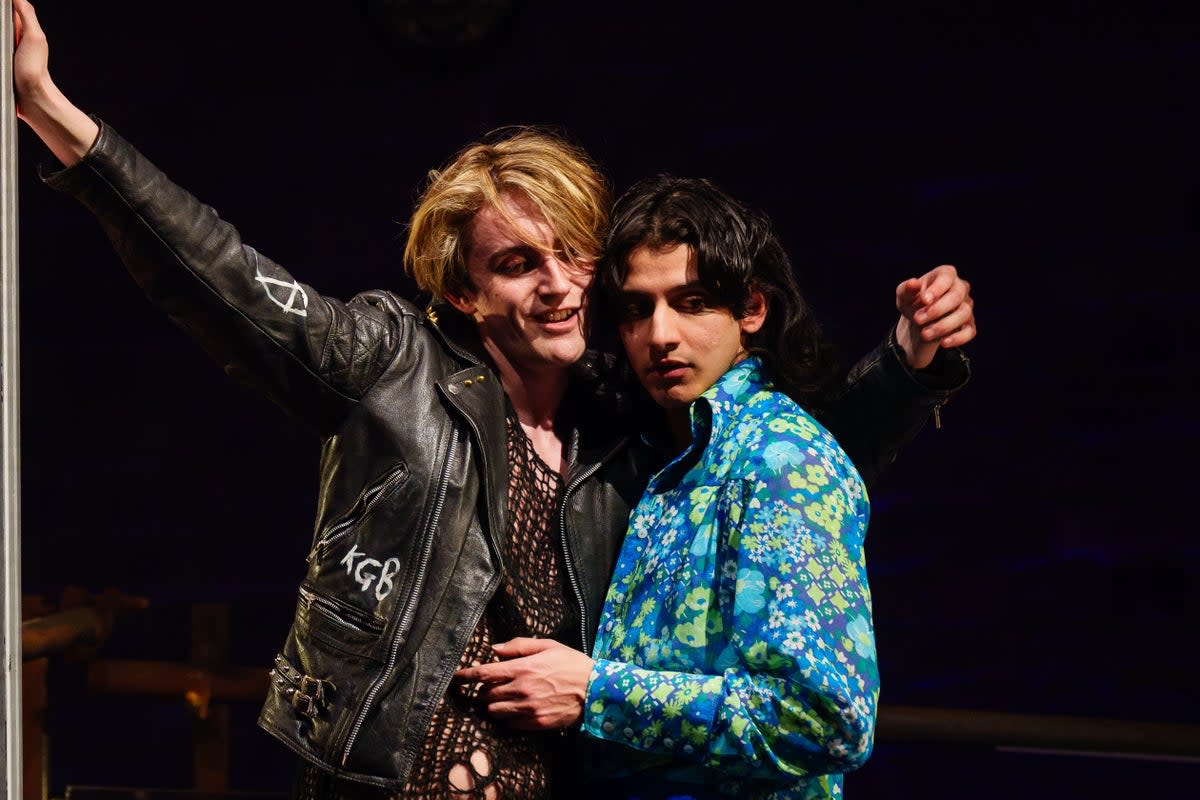The Buddha of Suburbia review: Hanif Kureishi’s sexy debut novel is full of energy on stage

For a relatively short novel, Hanif Kureishi’s The Buddha of Suburbia is a big and unwieldy thing. The incendiary 1990 book teems with incident and ideas – an irreverent, orgiastic odyssey following Karim, a mixed-race bisexual teenager, from his fraught family life in the 1970s suburbs to the London stage, and then to the druggy excess of New York. It’s hard to imagine how everything could fit into the temporal confines of a stage play. After seeing the RSC’s production, part of the inaugural season of new co-artistic directors Daniel Evans and Tamara Harvey, I’m still not sure it can.
Karim, played with credible adolescent swagger by Dee Ahluwalia, is the son of Indian immigrant Haroon (Ankur Bahl) and Margaret (Bettrys Jones), a white Brit. At the top of the story, Haroon, an impressively limber small-town guru-in-the-making, has started cheating on his wife with the brash, alluring Eva (Lucy Thackeray). Karim’s life is upended by his father’s infidelity; meanwhile, he finds himself groin-deep in romantic travails of his own.
Kureishi, who, alongside director Emma Rice, serves as “co-adapter” of his own material, has said his story is “supposed to be lively, funny, full of music, life and energy”. Buddha takes this brief rather literally. The show begins with a flashy, enthusiastic dance sequence, one of several musical flourishes. It is funny in parts – Bahl, giving one of the play’s more human performances, wrings big laughs from Haroon’s unlikely acrobatics, while Ewan Wardrop commands the crowd as smug, lascivious theatre director Matthew Pyke.
Buddha is filled with sex, though the play opts for comic horniness over anything authentically sexy. Acts are depicted throughout using prop fruit and party poppers. It’s funny, but a little shallow; the play ends up being frustratingly uninsightful on the topic of bisexuality, and of sex in general.
It’s tempting to attribute some of the flaws with Buddha to Kureishi’s personal involvement in the project – an urge to leave as much of the book as possible on the stage, when a more ruthless killing of darlings would have yielded something tighter and more emotionally coherent. The mess is, to some extent, the point – Karim’s journey is turbulent and unstraightforward as life often is – but what feels colourfully episodic as prose feels disjointed and scattershot here. Lost, too – except for short, third-wall-breaking interjections – is Karim’s own authorial voice, where much of Buddha’s richest writing lies.
The arc that suffers most for this is Karim’s relationship with Charlie, a teenage peer who topples into self-destruction after finding success as a musician. Played all too cartoonishly by Tommy Belshaw, the Bowie-alike love interest seems to tip the play into melodrama whenever he’s onstage; absent for much of the play’s narrative, he crops up again towards the end and we are suddenly supposed to give a damn about him. Karim might, but we do not.
Other performances are broad too, albeit some more winningly so – such as the abrasive Jeeta, played with shrill gusto by Rina Fatania, or the cuckolded naif Changez (Raj Bajaj). The production also makes savvy and pointed use of dual roles. Jones, for instance, plays both Karim’s mother and his first serious girlfriend – an Oedipal doubling that the script explicitly acknowledges at one point, for a punchline. Other instances, however, are subtler and more satisfying to chew on.
If only the play were chewier elsewhere. Yes, it’s full of movement and music and energy. But life? That requires a little more.
‘The Buddha of Suburbia’ is at the RSC’s Swan Theatre in Stratford-upon-Avon until 1 June
